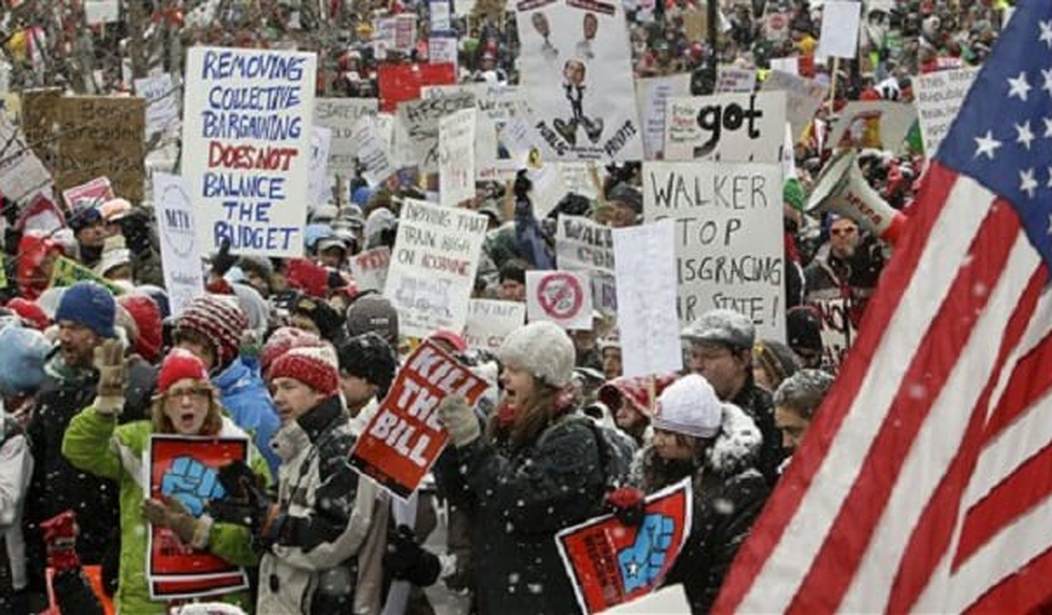The Throne of Skulls is for real. The Washington Post has noticed.
In an article carried on the front page, above the fold the Post announces Wisconsin Unions Crippled by Clash with Walker. While one can never give the Post credit for covering conservatives or the GOP fairly, this particular article is not going to hurt Walker with anyone to the right of a communist union organizer.
The anti-union law passed here four years ago, which made Gov. Scott Walker a national Republican star and a possible presidential candidate, has turned out to be even more transformative than many had predicted.
Walker had vowed that union power would shrink, workers would be judged on their merits, and local governments would save money. Unions had warned that workers would lose benefits and be forced to take on second jobs or find new careers.
Many of those changes came to pass, but the once-thriving public-sector unions were not just shrunken — they were crippled.
Unions representing teachers, professors, trash collectors and other government employees are struggling to stem plummeting membership rolls and retain relevance in the state where they got their start.
Here in King, Magnant and her fellow AFSCME members, workers at a local veterans home, have been knocking on doors on weekends to persuade former members to rejoin. Community college professors in Moraine Park, home to a technical college, are reducing dues from $59 to $36 each month. And those in Milwaukee are planing a campaign using videos and posters to highlight union principles. The theme: “Remember.”
Whether unintentional irony or an unexpected foray into truth-telling this actually sets up the conflict fairly well. Before the reform of public sector unions, Wisconsin and its municipalities were looking at an unending sea of red ink. The budget deficits were nearly impossible to close without extortionate tax rates because the “thriving public-sector unions” were immune from paying their fair share. With union reform in the shape of Act 10, much of the budget crisis vanished.
Walker’s administration has said forcing public employees to contribute more to retirement plans and health insurance helped local governments save $3 billion. The governor also has credited the 2011 law with saving homeowners money on property taxes while giving school districts the ability to make reforms that increased third-grade reading levels and high school graduation rates. And the law has emboldened Republican state lawmakers to further challenge Wisconsin’s labor movement this year by pushing right-to-work legislation that would allow private-sector workers to opt out of paying union dues — a measure Walker has said he would sign.
“We took the power away from the big-government special interests and put it firmly in the hands of the hard-working taxpayers,” Walker told Iowa Republicans recently. “That is what we need more of in this great country. The liberals don’t like that.”
The biggest impact, though, is in dealing a blow to the Democrat machine. In the 2004 election there were more votes cast in Milwaukee than there were registered voters. The Post has this to say:
The decline is politically significant in Wisconsin, a presidential battleground where the unions have played a central role in Democrats’ get-out-the-vote drives.
John Ahlquist, a University of Wisconsin political scientist who specializes in labor movements, said Walker had “effectively dismantled the financial and organizing structure of unions in Wisconsin.”
“Although it is too early to tell if unions are near the end of their political power here, they are in a very vulnerable position,” Ahlquist said.
What the unions are finding is that their decades of privilege as compared to private sector workers and their political bullying internally has left them with no supporters but a cadre of aging Alinsky-ites.
While some union members have been energized by the fight, they say they notice a new, more vocal animosity toward them. It has been particularly pronounced in rural areas, where public-sector jobs were some of the most prized gigs in town.
In King, population 1,700, Magnant said she couldn’t change a sign at the union hall without someone giving her the finger. Farther west, in Stanley, prison workers said they ditched their favorite pizza pub because the owner stood by while other customers called them “leeches.”
…
Two days later, she attended a union meeting that had been called to discuss possible changes in teacher retirement. Ten of the district’s 192 teachers had gathered at the meeting.
While the redoubtable Matt Lewis was fisking Scott Walker’s response to a trollish question (read my colleague Bill S. for a good rundown on this nothingburger) the Washington Post was managing to report on something substantive and something that will actually have meaning in the 2016 GOP primary. Walker has demonstrated that the political power of public sector unions can be broken and that they can be prevented from acting in the role of a parasite on the economy. He has demonstrated that public support for public employee unions is shallow and once you cross the Rubicon of stopping them from negotiating sweetheart deals there is no backlash to worry about.
That is what the press should be concentrating on, not the pathetic and silly stories about how well Walker handled being trolled.














Join the conversation as a VIP Member